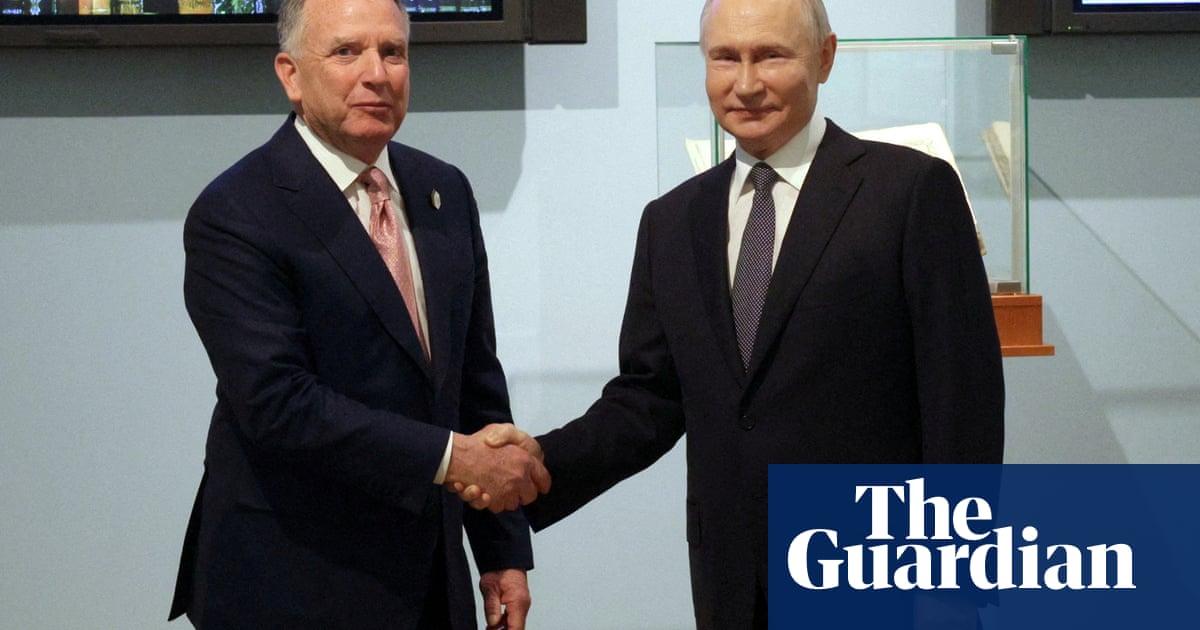When his jet lands in Moscow, Steve Witkoff – Donald Trump’s envoy and longtime friend – will mark his fourth visit to Russia this year, a pointed gesture that says as much about who he’s meeting as who he’s not.
The 68-year-old real estate executive, who holds no formal diplomatic credentials, was expected in London on Wednesday for talks with Kyiv and European allies.
But in a dramatic turn of events, Witkoff, along with the US secretary of state, Marco Rubio, abruptly cancelled the trip – underscoring growing tensions between Trump’s inner circle and both Ukraine and Europe – with the two US officials reportedly furious with Volodymyr Zelenskyy after Ukraine pushed back against a proposal from theTrump administrationto recognise Russia’s illegal 2014 annexation of Crimea.
For Moscow, it marked the latest symbolic victory in its efforts to pull the US closer to its side. Trump on Wednesday launched his latest tirade against Zelenskyy, placing sole blame for the lack of progress on the Ukrainian president.
In a post on Truth Social, Trump once again referred to him as “the man with ‘no cards to play,’” and claimed thatUkrainewas facing a stark choice. “The situation for Ukraine is dire – He can have Peace or, he can fight for another three years before losing the whole Country.”
From the outset,Vladimir Putin, flanked by trusted aides with decades of diplomatic experience, has worked to present Russia as the reasonable party in negotiations with Trump and keen to engage in talks, while painting Ukraine and its European allies as the ones standing in the way of peace.
That narrative appeared to be gaining traction in Washington – until Kyiv pushed back, in effect calling Putin’s bluff by demanding an unconditional ceasefire, which Moscow promptly rejected.
Sensing that Putin was stalling, Trump, who appears desperate to secure a ceasefire within his first 100 days in office – ie by 30 April – started issuing rare public criticism ofRussia.
The Russian leader quickly moved to curry favour with Washington, announcing a surprise Easter ceasefire – an offer the French foreign minister later described as an attempt to keep Trump from growing “impatient and angry”.
On Tuesday, the Financial Times reported that Putin had signalled a willingness to halt the invasion along the frontlines as they are now – in effect freezing the conflict, in what would mark the first tangible concession from his previously maximalist demands.
In exchange, Washington was reportedly prepared to formally recognise Russia’s annexation of Crimea and, implicitly, accept Moscow’s military gains since the full-scale invasion began in 2022.
A source familiar with Moscow’s thinking confirmed to the Guardian that Putin had floated the proposal during recent talks with Witkoff. However, the source also warned that the offer could be a strategic manoeuvre to draw Trump into accepting broader Russian terms.
Hints of what some of those demands could be began to emerge almost immediately. As in previous rounds of negotiations, Moscow appeared to soften its stance only to follow up with a series of fresh caveats.
Speaking to reporters on Wednesday, Dmitry Peskov, the Kremlin’s spokesperson, reiterated Russia’s opposition to the presence of European peacekeeping forces in Ukraine – a model Kyiv views as its best alternative to Nato membership to protect it from a renewed Russian assault.
Valentina Matviyenko, the speaker of the Russian federation council, the upper house of the Russian parliament, was even more direct: Russia will never take part in negotiations that involve the idea of deploying European forces on Ukrainian territory.
Even among Russia’s elite, it remains unclear whether Putin is intentionally stalling the peace talks or simply trying to squeeze as much as possible from Trump before committing to a course.
Konstantin Remchukov, a well-connected Kremlin-aligned newspaper editor, wrote in a column published on Sunday that Moscow could end the fighting once it had expelled all Ukraine’s forces out of the Russian region of Kursk.
“When they liberate the last half a per cent, then the troops can stop wherever they are when the news reaches them,” Remchukov wrote in the Nezavisimaya Gazeta.
But in an interview with the Guardian earlier this month, a source with close ties to senior Russian officials said Putin appeared prepared and willing to continue fighting for full control of the four Ukrainian regions he claimed as Russian territory in 2022.
There are also growing questions about how long Putin can sustain his delicate balancing act: keeping Trump engaged without provoking his anger.
JD Vance, the US vice-president, on Wednesday emphasised that the clock was running down. “We’ve issued a very explicit proposal to both the Russians and the Ukrainians, and it’s time for them to either say yes – or for the US to walk away from this process,” he said, becoming the latest official to issue a warning.
Yet the Kremlin seems to be deliberately dragging its feet, with Peskov advising Trump this week against “rushing a resolution to the Ukraine conflict”.
“Putin appears undecided: walk away from Trump, or continue trying to leverage him to serve Russia’s interests,” said Alexander Baunov, a political analyst at the Carnegie Endowment for International Peace.
However, with Trump unlikely to increase military support for Ukraine under any scenario, Baunov noted that “the prospect of the US pulling out of peace mediation between Russia and Ukraine doesn’t particularly alarm the Kremlin”.
“In that case,” Baunov added, “things would simply continue as they have in recent months, which, by most accounts, has worked to Russia’s advantage.”
For now, Moscow is focused on Witkoff’s upcoming visit and other urgent matters – like picking out the next gift to flatter his boss, after Putin presented him with a kitschy Trump portrait last month.
